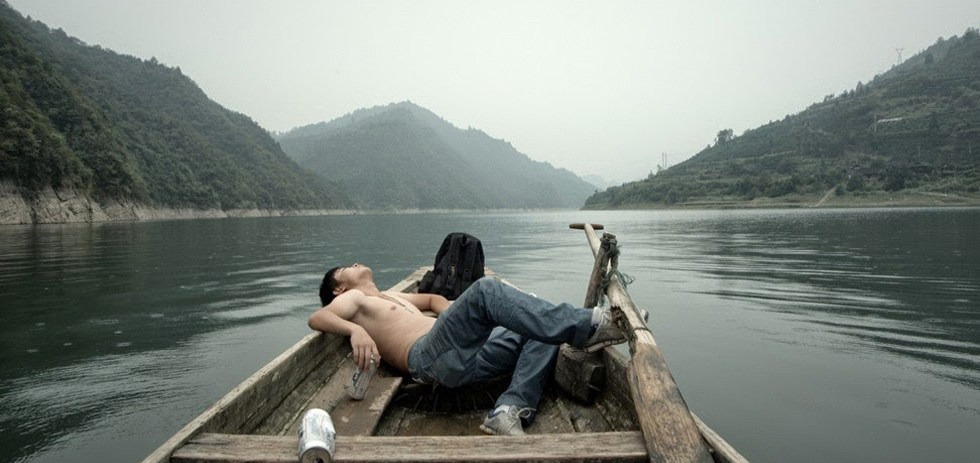
The beauty of Sydney Film Festival is always in the films that will never get a wide release in Australia, those without a hardworking promotion team working to get the work on the Official Competition; the films that define the festival. This year, a great deal of these have been floating around the China: Rebels, Ghosts and Romantics section – which has been painting a portrait of China as one of the most prolific, creatively energised and determined cinematic communities at the festival. With Yang Heng’s Lake August (那片湖水), however, the selection has found its strongest work. The opening shot of the movie – an awe-inspiring wide shot of a lake punctuated by a mountain range, featuring a lone naked man crying and howling – sets much of the tone for the film. After a lengthy take, the camera pans away from the man as his suicide by drowning plays out off-screen; in a scene that defines the mood, pace and subtlety of the film. This figure is immediately revealed as the father of the loose protagonist of the film, Ah Li; a man living in Jishou defined by a stark sense of loneliness enamoured in a layer of apathy that makes something initially cliche more nuanced, realistic, and at times, even amusing.
Lake August is the latest film in a long line of minimalist masterpieces coming out of Asia – instantly recalling Edward Yang’s Yi Yi and even the Japanese Takeshi Kitano’s Hana-bi; both as films which make their strongest statements in their most restrained moments. It’s a film that trades witty monologues for silent long shots that examine the world that frames the characters in the film as much as the characters themselves. Yang Heng works with an incredible depth of field, and the characters drift between focus and periphery as the immersive settings only seek to further emphasise their insignificance. Lake August is a slow-moving film in narrative and action, yet its frames and shots are multifaceted pieces of art on their own accord. Heng has a highly defined style that he’s articulated to a markedly more distinct degree in his latest work; his characters move around in a confined and claustrophobic foreground, whilst the landscapes behind them drift off indefinitely, leaving the humans in the frame with a tacit insignificance. In Lake August, the contrast between these sublime shots of nature and the cruel impermanence that marks these protagonists is amplified and refined by Heng’s use of wide shots, often intensely long takes, and a masterful depth of frame that creates a palpable and unique sense of ennui on its own accord.
Heng’s film is all the more remarkable for its ability to be made outside the Chinese industry and the system it espouses – yet at the same time, it’s hard to imagine it emerging in any other context. The film is something remarkably unique not through overt intricacies – such as a complex winding plot, or fast-paced experimental camerawork – but through Heng’s trademark minimalist subtleties. In what seems to be a running trend of English release re-workings of original titles bastardising the meaning and emotional expression of the actual translation, Na Pian Hu Shi (那片湖水) – the original title of the film in Chinese – more accurately translates to “That Stretch of Water in the Lake”. The implications of the original name add to the stark isolation that is present in the microcosm that Jishou presents; Heng’s latest film is contained within its shots – by the water in the lake – and the strength in which they are presented never sees the viewer wandering away from it.
The most cathartic scene in the film aggressively rails against the conventional idea of a catharsis, in that it happens far closer to the opening of the film than the end. Despite being a state of perpetual binge drinking throughout the film, Ah Li, Monkey and Ah Fang peak in inebriety whilst lying on a couch by the lake as Lake August’s sole piece of music in the film blasts out of stereo punctuated by all three singing along. The immediate contrast created by Heng adds a previously absent layer of playful intimacy with the characters that lasts throughout the film. As the film continues beyond this oddly energetic scene, Heng makes it clear he’s not going to give the audience any greater catharsis; his mastery is in his ability to make the audience realise that they don’t desire or need anything remotely cathartic by this stage anyway.
When Heng does focus in on his subjects, he does it with a rare intimacy that neither romanticises nor trivialises them; presenting them as highly defined, impermanent and self-aware – never detached from a realism that carefully drifts between quiet contentment, sadness and disinterest. Smoking, drinking and watching pornography are all done with an eerie sense of detachment – with one poignant scene making one of the most palpable statements on Ah Li as he simply falls asleep whilst watching pornography on his computer with a markedly blank expression, dropping his empty can of beer in the process. Lake August feels like a response to China’s teleological move towards the industrial, fast-paced and city-focused stories in its cinematic world. It’s almost as if Heng – originally from Hunan – is quietly reminding the audience that there is a quieter, slower-moving, and equally complex world existing in the background. Much like in Lake August, Heng is concerned with every aspect of the frame, as well as every aspect of society. It’s this attention to detail in all of its manifestations that makes the film one of the most delicate, important and powerful films to screen at Sydney Film Festival.
Around the Staff:
| Mei Chew | |
| Matilda Surtees |
